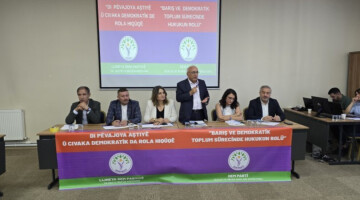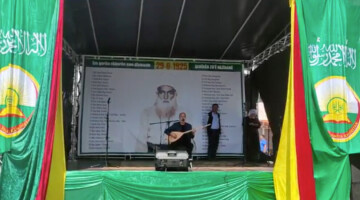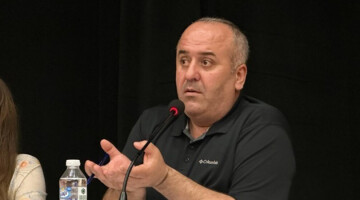Those who had to migrate from Serêkaniyê and Girê Spi, the cities occupied by the Turkish army, have been forced to reside in camps or places offered by the Autonomous Administration for three years. The expenses of the camps are mostly covered by the Autonomous Administration. In the last three years, a policy of Turkification has been carried out in the two occupied cities along with inhumane crimes such as kidnapping, rape, murder, theft and demographic change.
After the Turkish occupation, the local people were subjected to migration and settled down in schools in the region, especially in Hesekê, where the Autonomous Administration of the North and East Syria looks after them. In 2020, the Autonomous Administration started to construct the Serêkaniyê and Washokanî Camps for the refugees. A camp was also established in Raqqa for the people of Girê Spi. The Autonomous Administration, which covered most of the expenses of these camps, received support from aid organizations, yet many of them turned their backs on the people of Rojava.
WASHOKANI CAMP
The camp was opened on 24 October 2019 in the west of the city of Hesekê, 13 km away from Tell Tamer. Children in the camp make up 50 percent of the camp population. There are 1,987 tents and 2,355 families reside in the camp. The total population of the camp is 16,306 people.
SERÊKANIYÊ CAMP
After the Turkish invasion attacks on Serêkaniyê, the Autonomous Administration started to construct the Serêkaniyê Camp on August 1, 2020. Currently, 2, 395 families live in the camp where there are 2,793 tents. 154 tents in the camp are used as kitchens. The total population is 13,729.
AUTONOMOUS ADMINISTRATION BEARS ALL BURDEN
The Autonomous Administration bears the entire burden of both camps since their establishment. Partial aid from aid organizations such as Ekted, NRC, IRC, AŞNA, Heyva Sor a Kurd, KRC, UPP, Selam Centre, SP, Plomond, Jiyan Centre, Nûjin Centre cannot meet the needs of the refugees.
NEEDS OF REFUGEES
Health: There are clinics and health centres in both camps. These health institutions can only intervene in emergency cases due to their limited means. After a first response, patients are transferred to nearby hospitals by the emergency medical teams of Heyva Sor a Kurd. Both camps need medical supplies, pharmacies, laboratories and health personnel. A place has been built in the camp to deal with epidemics, but no aid organization is helping to make it full-fledged.
Shelter: There are 4,780 tents in total in the camps. However, more than one family has to live in the same tent due to the lack of tents. Despite the demand for tents from international aid organizations by the camp administration, no response has been received so far.
Education: The Autonomous Administration also takes care of the education of refugee children despite its limited means. In the camps, education was first offered in tents. Later on, small schools were built. More than 6,000 students study in these schools. Some children have no access to education because of the lack of space. Students also need school educational equipment. Notebooks, pens, blackboards and especially benches are needed.
Infrastructure: While tents were not built properly due to the ground of the camp, the residents face major problems due to lighting, electricity and expenses.
JOB OPPORTUNITIES
The Autonomous Administration creates job opportunities for unemployed refugees in the camp. While some of them are employed within the institutions, projects are being developed to reduce unemployment in the camp.
BALANCE SHEET OF THE INVASION
The Serêkaniyê Migrant Committee released a three-year balance sheet of the occupation in Girê Spî and Serêkaniyê, which is as follows:
* Since the occupation in October 2019, 511 people, including 68 women and 42 children, have been arrested.
* 185 people have been kidnapped.
* 325 people have been tortured.
* At least 5 people have been tortured to death.
* 92 detainees, 48 of whom were sentenced to prison sentences from 13 years to life imprisonment, have been transferred to Turkey.
* 56 people, 11 of whom were women, have been killed.
* 11 people have been executed.
* 2,500 migrant families have replaced original residents.
* 55 Iraqi ISIS families have been resettled in the confiscated houses in Serêkaniyê.
* More than 5,500 houses and more than 1,200 shops have been confiscated in the two occupied regions.
* 55 villages have been evacuated along with their original residents.
* More than one million acres (100 thousand hectares) of land has been confiscated.
* At least 72 explosions have occurred; 145 civilians, including women and children, have lost their lives and more than 300 have been injured.














